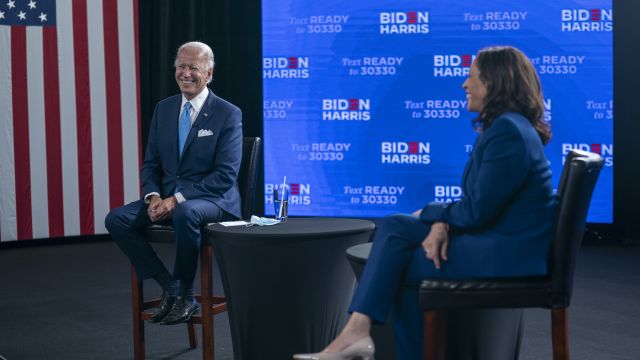The desire to take back the White House four years after the Republican nominee’s shock victory at the expense of Hillary Clinton has given the party a focus as it prepares to formally nominate Joe Biden for the presidency.
Democrats admit they have their differences but that the need to defeat Mr Trump means they will have to be surmounted in an event where speakers will make their contributions remotely because of the pandemic.
“Nobody fits neatly and tightly into any one bucket,” said Georgia Democratic chairwoman Nikema Williams ahead of a convention which was originally intended to be held in a large hall in Milwaukee, in the key swing state of Wisconsin.

“What we all fit into is knowing that right now we don’t have leadership in our country, and it’s hurting all of us.”
That is an important shift from 2016, when Mrs Clinton struggled to build a coalition between her supporters and those who backed Senator Bernie Sanders, who again finished as runner-up this year.
It reflects both the work Mr Biden has done to court the left and the urgency among Democrats to defeat Mr Trump, which has only intensified amid the pandemic, economic turmoil and a national reckoning on racism.
Still, the party’s ideological splits have not vanished.
I know a thing or two about being Vice President — and I know @KamalaHarris is the best partner I could have for the fight ahead.
— Joe Biden (@JoeBiden) August 15, 2020
Advertisement
There are disagreements over how to achieve universal health care, make higher education affordable, overhaul law enforcement practices and reengage with countries that are questioning the US’s role in the world.
Leaders on the left warn that Mr Biden must still keep their interests in mind, offering a reminder that even a November victory will not guarantee a united front during a Biden presidency.
“Progressives are going to vote against Trump,” said Stephanie Taylor, co-founder of the Progressive Change Campaign Committee, but she called it “demoralising and wrong” for Mr Biden and the Democratic National Committee to give convention airtime to figures like billionaire Mike Bloomberg, the former New York City mayor who spent more than 500 million US dollars of his own money running for the nomination.
Ms Taylor nodded at Mr Biden’s pick of Kamala Harris as his running mate, the first black woman on a major party’s ticket.
But she cast the California senator, who is also of Asian descent, as an establishment politician alongside Mr Biden, a former vice president first elected to the Senate in 1972.

“If Biden and Harris want to energise progressives to donate and volunteer,” Ms Taylor said, “they need to elevate leaders like Alexandria Ocasio-Cortez and Julian Castro, and policies like cancelling student debt and Medicare for All.
“Progressive energy matters, and voter energy matters.
“We’re fighting Trump as hard as we can right now — just don’t take that for granted.”
In fact, Ms Ocasio-Cortez, the New York congresswoman and a face of young progressives, and Mr Castro, who set the 2020 presidential field’s left flank on immigration, will speak during the four-night convention.
But Ms Taylor’s sentiment underscores the complexity in Mr Biden’s effort to corral the spectrum of voters dissatisfied with Mr Trump.

Despite Mr Biden’s five decades at the core of the Democratic Party, he is not a natural fit for every faction in 2020.
As younger activists gain clout in shaping the party’s priorities, Mr Biden will be 78 on Inauguration Day, making him the oldest person to assume the presidency if he is elected.
As a white man, his core constituencies are white moderates and black women, who revived his campaign in part because of their appreciation of Mr Biden’s service as vice president to Barack Obama, the first black president.
And his reverence for institutions such as Congress is at odds with the most intense voices of both political parties, where activists often put a premium on outsiders and aren’t eager to compromise.
To a large degree, Mr Biden is comfortable with the challenges.
From its start, his campaign has been as much a moral argument against Mr Trump as about settling an absolute identity for his party.
He has said plainly he would not have run if Mr Trump were not president.







